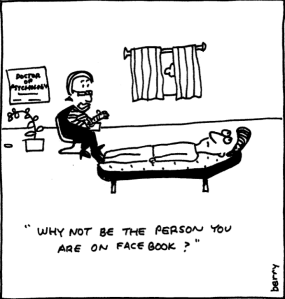I’ve noticed some Facebook unrest recently, people equating it to the devil and whatnot. Actually, the unrest isn’t all that recent. It’s been this way pretty much since the onset. Really, it’s a testament to how powerful a tool Facebook is that it’s remained so prominent. The way people, and by ‘people’ I mean the people I’m friends with, use it has evolved through the years. But I digress. First allow me to enunciate the different types of users. The list is in ascending order of contribution frequency.
•The Tree Who Fell in the Woods: Doesn’t have an account. It begs the question—if a person eats, sleeps, and breathes but doesn’t have Facebook, does he exist?
•The Abandoned Building: Having an account but not checking, updating, or participating in any way.
•The Ghost: Having an account and pretending to be an Abandoned Building but secretly consuming like The Whore.
• The Whore: Likes everything but contributes nothing beyond birthday posts.
• The Moderate: Contributes and consumes in a thoughtful way, successfully toeing the line between doing so too frequently and too infrequently.
• The Old Person: Over 60 and very actively participates on threads held by those who are more than 30 years younger and with whom he’s very tenuously connected.
• The Advertiser/Activist: Uses it primarily to spread word about his, his company’s, or his favorite causes’ latest endeavor.
• The Spazz: Posts at least once every 48 hours. The content is usually inane and reveals some sort of gap in awareness. The Spazz is a lot like The Old Person but doesn’t have the excuse of being old.
• The Narcissist: The most damnable of users, The Narcissist posts at least every 24 hours and is clearly in love with him/herself.
Most people consider themselves either an Abandoned Building or a Moderate. I consider myself a Moderate. Such an indulgent word, isn’t it? I’m sure more than half of you think I’m a Spazz. I’m not! I’M NOTTTTT!!!! Convinced? Oh shit, this is very Narcissist of me, isn’t it? I know, right!
But enough about me.
But more about me!
One trend I’ve noticed is that it’s somehow more desirable to be seen as an Abandoned Building than as a Moderate, and that’s why there are so many of you Ghosts out there. I know for a fact that Ghost is the most common type of user among my friends because the previous roaming20s post, the one about the value of money beyond functionality (you should know, you read it), got 300 views but only 5 Likes. As I have around 700 friends, it means 3 out of 7 of you clicked on the link. The low Like-frequency (LF) could be attributed to poor content quality or generally not wanting to associate with me in a visible way, but that’s obviously not the case. I mean, seriously, you read the article. You know how perfect it is! No, there are greater issues at play.
This leads to an excerpt from a recent, rather Seinfeldian, conversation with the photographer of my most recent profile picture:
Ghost: “It’s perfect! I stared at it for LITERALLY 15 minutes! With the umbrella and the sunglasses! At the same time! And the shirt! Oh my God! Everything just came together! The Eiffel Tower in the middle, and the spire on the far left to give it balance! It was just too good! Unbelievable!”
Me: “If you liked it so much, why didn’t you Like it on Facebook?”
Ghost: “I’m not a Liker.”
Me: “Why not? It’s one of the most non-zero-sum things you can do. Nobody judges you for Liking a photo, and the recipient appreciates it. Don’t you like it when others Like your stuff?”
Ghost: “Ya, that’s true. I guess I just don’t want to be known as someone with a social media presence. If people see that I use it, my anonymity is gone.”
Me: “What’s so bad about a social media presence?”
Ghost: “I just don’t want a footprint. There are so many people who I like less just because of how they use Facebook. People don’t think better of you based on how you use it. At best you break even, and that’s rare.”
Me: “But you liked that photo you took, didn’t you?”
Ghost: “It was glorious!”
Hence, my thesis: Spazzes and Narcissists scare the layman into Ghosthood, or, worse, into becoming The Tree Who Fell in the Woods. Because of a chronic and persistent lack of awareness among the most vocal 5%, Facebook has been ruined for the majority. Otherwise-Moderates have lost their voice!
The saddest part, I think, is that one of our generation’s most useful tools carries such stigma. It’s faux-pas to reference something from Facebook in a face-to-face interaction. Or information gleaned from any form of Internet stalking, for that matter. A former colleague of mine famously let slip about another former colleague, “She’s younger than me. She was in First Grade in 1998.” Is that creepy? Come on. Don’t pretend to have never had a conversation with a person in which you had to be careful not to let slip knowledge gained from a nice little Google search. It should be assumed that people know everything about you that’s on the Internet. That’s what admissions and Human Resources personnel say. In that sense, it’s a good idea to minimize, or at least manicure, your digital footprint.
At ease with the generally creepy, I, for one, love Facebook. A person’s relationship with social media requires some customizing for it to be enjoyable. The majority of Facebook malaise, I contend, results from finding it frustrating that a digital medium requires so much psychoanalysis. The reason I love it is I’ve eliminated the annoyances. I’ve chosen not to follow all the Spazzes, Narcissists, and people I don’t particularly want to know about, such as Jabronis and ex-romantic interests. Another thing I’ve started doing is Liking favorite sources of news and information. Now that Grantland, Quartz, The New Yorker, and Rafael Nadal appear on my newsfeed, my procrastination has been streamlined. If you use it the right way, it’s an incredibly practical tool!
 It’s the human part that makes it tricky. It’s a trilemma, participating yet remaining the least bit fetching. The individual has to align the way he sees himself, the way he would like to be perceived by others, and the way others perceive him outside of the platform, all in an appealing way. This leads to another rule, Rule #1, in fact. It dictates: there’s nothing you can do on social media to get someone to like you if they don’t like you outside of it. Thus, altering one’s identity is strategically ill-advised because the only result is to turn off those who might’ve wanted to follow you. The biggest truth about social media is it exposes major insecurities and delusions among its contributors, whether they’re aware of them or not.
It’s the human part that makes it tricky. It’s a trilemma, participating yet remaining the least bit fetching. The individual has to align the way he sees himself, the way he would like to be perceived by others, and the way others perceive him outside of the platform, all in an appealing way. This leads to another rule, Rule #1, in fact. It dictates: there’s nothing you can do on social media to get someone to like you if they don’t like you outside of it. Thus, altering one’s identity is strategically ill-advised because the only result is to turn off those who might’ve wanted to follow you. The biggest truth about social media is it exposes major insecurities and delusions among its contributors, whether they’re aware of them or not.
There are subtle ways of pandering to the loosely connected while appeasing the masses though. One might, purely hypothetically, change his profile picture to a glamor shot in front of the Eiffel Tower before sending a friend request to a jolie femme he recently met. Such scheming is only petty once an audience is aware that it was calculated, purely hypothetically speaking. (Throat-clear).
As has been illustrated, the politics of Facebook are difficult to navigate. It’s been made even trickier, especially for The Old Person, because usage trends evolve both naturally and due to changes in age and location. Back in 2006, when Facebook got started and I was in high school, Wall Posts were competitive because Facebook displayed how many posts you had. Further, a large number of friends was representative of high social standing, and we talked poorly about people artificially inflating that number.
These days, Likes are the currency. The super-competitive socialites have moved on to Instagram. In my Insta-episode, my 12 hours on Instagram, I mistakenly chose to “Follow” all of my Facebook friends. This was before I realized Instagram prominently displays how many people “Follow” you and how many people you are “Following.” The game is to “Follow” fewer people than are “Following” you. After 12 hours in which I was “Following” 300 people and only 40 “Followed” me back, I felt very uncool. It’s funny how a 25 year old can feel like he’s 15 again. I cut my losses and quit Instagram after a person I dated briefly in October Liked my profile picture but opted not to “Follow” me. What a bitch. It should be noted that she was very IN on Insta, as she had over 3,000 “Followers” and only “Followed” 250 people.
Rest assured, I’m still very much on Facebook, where Likes carry almost as much caché. Liking-frequency (LF) behaves a lot like an inverse tangent function (pictured below) that’s been shifted up and a little to the right. What usually happens is your Facebook Allies (FAs) Like everything you post. After a critical number, say 20, second-degree connections join in. At another critical point, those second-degree connections have been exhausted, and the likes begin to plateau around a limit. This tailing-off is the most interesting part because that’s when the real randos, the ones you haven’t seen or heard from in years, make themselves known. Unfortunately, most of them are Spazzes.
 Major life events such as engagements, career successes, graduations, and births of kids garner the most Likes. If you’re particularly wealthy or prominent, Like totals are artificially inflated via suck-ups becoming FAs. And if you’re going for glory, if you want to test out your upper-bound, there’s a formula: Alert people that something awesome has happened to you in a ‘humble’ way. My personal favorite has been, “Didn’t know I looked like such a slob until I saw this picture of me on Forbes’ 25 Under 25. Honored nonetheless!” That one got hundreds. If nothing else, Like-a-Palooza tells you who in your network you should be jealous of, and if you’re anything like me, you’re a bit scornful, secretly liking these people less, even though you don’t actually know them.
Major life events such as engagements, career successes, graduations, and births of kids garner the most Likes. If you’re particularly wealthy or prominent, Like totals are artificially inflated via suck-ups becoming FAs. And if you’re going for glory, if you want to test out your upper-bound, there’s a formula: Alert people that something awesome has happened to you in a ‘humble’ way. My personal favorite has been, “Didn’t know I looked like such a slob until I saw this picture of me on Forbes’ 25 Under 25. Honored nonetheless!” That one got hundreds. If nothing else, Like-a-Palooza tells you who in your network you should be jealous of, and if you’re anything like me, you’re a bit scornful, secretly liking these people less, even though you don’t actually know them.
It’s these Like-related stresses causing most of the Facebook unrest, causing people to equate it to the devil and whatnot. Disagreeing with your network on who has been crowned king and queen, and so forth. To enjoy Facebook, it’s important both to know that the high-schoolish part exists and to not pay it much credence, focusing instead on the positives. And Facebook’s positives are so powerful! With it you can keep up with people you don’t see or talk to regularly. That’s a huge upgrade on the nothingness that it replaced! This brings me to my issue with Ghosts, beyond them not Liking my shit. It’s selfish to consume without contributing every once in a while. More so, it’s creepy to covertly keep tabs on everyone. We want to see you, provided it’s from neither too close up nor too far away, and we want to hear from you, provided you’re neither doing too well nor too poorly.


So are we only “tenuously connected”, Philip? “Old Persons” can, if they wish, relate easily to younger people. Didn’t we have to raise them? Equating “Old Persons” posts to those of “Spazzes” is just plain mean. No credit for wisdom that comes with age, then? You are a very good writer but you could do even better with some self-critical editing!